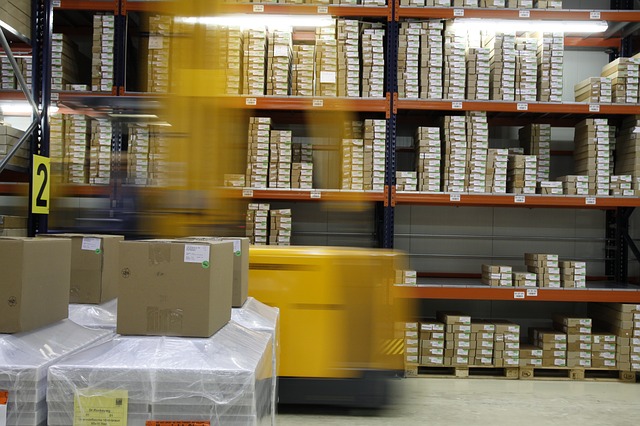According to official reports, the UK commercial and industrial sectors generated 37.9 million tonnes of waste in 2017 and, after China’s recent waste import restrictions, keeping this number in check could become a serious challenge. Now that waste is no longer that easy to export, and landfill space is close to reaching its limit, it’s up to each business to optimise its waste management strategy and implement effective ways of reusing and recycling materials instead of sending them to the bin. Warehouses and distribution centres are two types of businesses that can contribute significantly to the solution because they work with large amounts of cardboard and plastic. However, because they are often very large and even consist of several buildings, implementing a sustainable waste management strategy throughout can be difficult.

Why is it important for warehouses to reduce waste?
For many years, waste was commonplace in warehouses and distribution centres, but in 2020 the old approach is both unstainable and frowned upon. Far from being a simple trend, going green and minimising waste is an important business decision that can help you tackle many internal issues, in addition to being good for the planet:
- Reducing waste in warehouses saves you space, time and money, thus increasing business efficiency.
- It can benefit your business reputation. Recycling isn’t just a commercial concern. Individuals are interested in it as well and household recycling rates have increased in the past few years. Consumers are becoming more eco-aware and sustainability is now one of the factors they use to rate businesses. Adopting green practices and being mindful of your packaging can earn you the respect of your customers. On the other hand, failing to reduce waste can attract customer dissatisfaction, especially on social media, where people can complain about brands using too much packaging.
- Collecting and storing waste responsibly makes the workplace cleaner and safer, reducing the incidence of work accidents or work-related illnesses.
Waste reduction strategies in warehouses
Creating a long-term waste management plan for your warehouse might seem complicated, but if you take the time to reconsider the environmental impact of every one of your processes, the results will be worth it.
Reuse packaging whenever possible
Recycling is a crucial part of the waste hierarchy, sure, but it’s the last of the three R’s: reduce, reuse, recycle. To truly help the planet, and make a long-lasting change, first you need to identify the process that produces the most waste, try to reduce that waste and, when it’s not possible, recycle it. Make a habit out of reusing cardboard boxes for office equipment or storage and in the long run this will help you save even more money and space, while at the same time helping the environment.
Train your staff
For any strategy to work, there needs to be communication across all departments and your staff need to understand what changes will be made and why. No matter how good your intentions may be, and no matter how well waste management goes in theory, you also need to train your employees if you want the plan to work in practice too. If you have the resources, enrol your staff on recycling training courses or, if not, inform them of how they will need to modify their waste management procedures. Make sure they all have the necessary documentation to refer to when something isn’t clear, and consider appointing a staff representative to oversee waste management.
Change your loose fill policy
Loose fill is one of the most common complaints that warehouses get. Not only is it impractical and frustrating for customers to receive one small product in a huge box, wrapped in an unnecessary amount of bubble wrap, but also wasteful for the warehouse and damaging for the environment. If the problem comes from company policy, then you may want to consider smaller size boxes or switching to biodegradable loose fill. Otherwise, make sure employees understand the difference between various types of loose fill and choose the right one depending on the type of product being shipped.
Invest in the right containers
To recycle properly, you need to find a professional supplier who can offer you on-site containers that cater to your needs and goals. Fortunately, recycling has become more and more affordable in the UK and you don’t need to sacrifice your finances to save the planet. As more and more waste management companies lower their fees, warehouses, distribution centres and other businesses are expected to join the race for sustainability. For example, the Reliable Skip Hire branch in Bristol announced lower prices for recycling materials and discussed new lower rates being piloted in Bristol for commercial clients prepared to make the effort to separate their skip hire waste into specific materials, making it easier for the waste transfer stations to process and recycle. Once you find the right containers for your warehouse, make sure you label them clearly and place them in the most convenient location possible. If you want the recycling rate to grow, this gesture has to become effortless.
Get involved in community projects
If you want to reduce the amount of waste even more and give new life to the materials you would normally throw away, consider getting involved in community projects. Leftover cardboard and plastic packaging may seem like trash, but there are many organisations that need it. For example, did you know that animal shelters and charities could use more cardboard boxes to hold pets and send gifts? Ask around your area and you’ll be surprised that many people will be willing to come pick up collect materials themselves!
Use the right materials
Last, but not least, always make sure your warehouse uses eco-friendly materials. When possible, choose recycled cardboard and paper for packaging, and use friendlier alternatives. For example, when transporting items around the distribution centre, wrapping them in stretch film instead of placing them in large boxes can save you money in the long run.




Comments are closed.